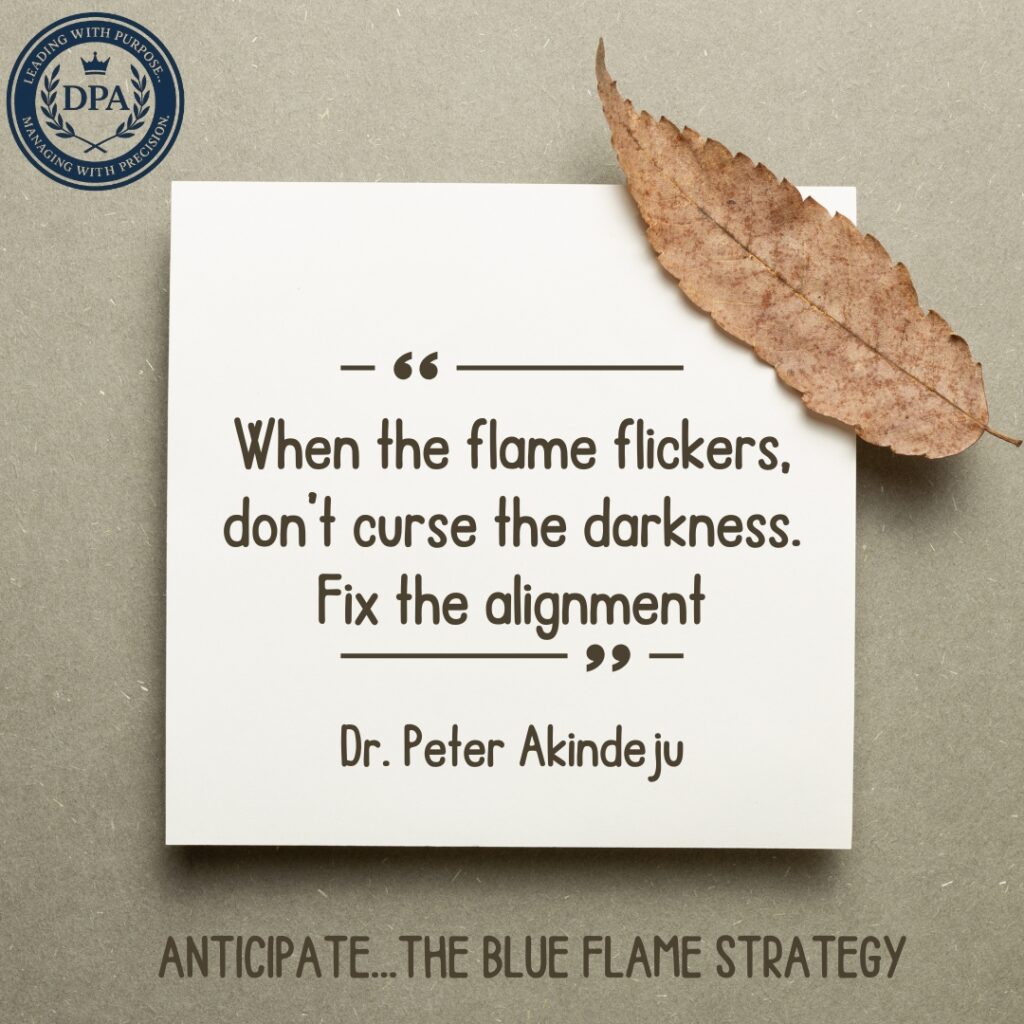
The Reality: Ambition Meets Friction
Across Nigeria and West Africa, CEOs face a paradox. On one hand, optimism is rising: 61% of Nigerian CEOs expect global economic growth to improve in 2025, and nearly two-thirds are confident about domestic recovery. On the other hand, harsh realities persist, currency volatility, policy uncertainty, inadequate infrastructure, and escalating costs. The Manufacturers Association of Nigeria (MAN) reports production and distribution costs surged 18.2% in Q4 2024, following a 20.1% increase in the previous quarter.
The instinct may be to lament these headwinds. But leadership isn’t about cursing the darkness—it’s about aligning strategy, people, capital, and infrastructure so they work together to keep the flame burning.
Strategy Must Match Reality
A clear strategy is no longer enough; execution depends on whether operating models and resources align with market realities. PwC’s 2025 CEO Survey shows 61% of Nigerian CEOs have entered new sectors, and 56% are targeting new customer bases.
Turning ambition into results starts with translating broad goals into measurable outcomes such as increasing market share by 10%, achieving a 25% EBITDA margin, or expanding into three new customer segments within 18 months. These outcomes become the organization’s compass, guiding sharper decisions across all levels.
Next, scrutinize initiatives through this lens. Many firms spread resources thin across too many priorities, leading to effort without impact. Every project and budget allocation must clearly link to one of the defined outcomes, or be redesigned or dropped.
Finally, align operating models and hold leaders accountable. Shift capital to high-potential areas, redeploy talent where they add the most value, and streamline processes that slow execution. Assign ownership for each outcome, set milestones, and review progress frequently. This transforms strategy from a static plan into a living discipline, one that consistently delivers despite uncertainty and competition.
Speed Matters as Much as Direction
In markets defined by unpredictable regulations, the speed of decision-making can make or break growth. Many African CEOs cite policy inconsistency as a key barrier to investment. Waiting for perfect clarity is no longer viable.
Agility starts with a RACI framework (Responsible, Accountable, Consulted, Informed) to eliminate confusion over who decides what. It then requires pushing decisions closer to where the action is, empowering frontline teams to act within clear parameters, escalating only when strategic thresholds are crossed.
Track your “decision velocity”, how long it takes to move from problem identification to resolution, and treat delays as performance issues, not inevitabilities. Finally, embed agility into culture by celebrating decisive action and openly learning from failures. Organizations that make speed a habit turn unpredictability into a competitive advantage.
Infrastructure as a Core Strategy
Nigeria’s infrastructure deficit, especially in energy, remains a major drag on competitiveness. Frequent grid failures and surging fuel costs add systemic risk. MAN attributes an 18.2% rise in Q4 2024 manufacturing costs to escalating energy prices alone.
Businesses must treat energy as strategic, not just a cost. Start with energy resilience audits to understand dependencies, vulnerabilities, and downtime costs. Use this insight to invest in hybrid solar-storage systems, captive generation, or wheeling agreements for stable, predictable power.
Reliable, cost-effective energy is not just about survival, it’s a long-term competitive edge. It enables consistent delivery, supports scaling, attracts investment, and strengthens ESG credentials. Assign senior ownership, track metrics like energy cost per unit of output, and integrate energy strategy into core planning.
Engagement Is a Business Metric
Even the best strategies fail without engaged people. Gallup’s 2024 Global Workplace report shows low engagement eroding productivity worldwide. In West Africa, where inflation and uncertainty weigh heavily on employees, engagement has become a CEO-level imperative.
Make engagement a KPI for leaders and track it alongside financial metrics. Run quarterly clarity sessions to connect employees’ roles to enterprise goals and answer their questions openly. Align incentives with long-term value creation, not just short-term gains, to encourage sustainable success.
Treat engagement as a continuous conversation; gather feedback, act on it visibly, and recognize teams that embody company values. Over time, this builds a culture where employees feel connected, respected, and motivated to turn strategy into results.
From Excuses to Alignment
Policy swings, energy costs, and infrastructure gaps are real. But leaders have a choice: dwell on constraints, or build alignment.
By grounding strategies in reality, accelerating decisions, investing in resilient infrastructure, and engaging their people, leaders can shift from reactive survival to proactive growth.
The flame may flicker, but with true alignment, it can shine brighter than ever.
References
- BusinessDay – Policy Inconsistencies Hampering Industrial Targets: https://businessday.ng/real-sector/article/nigerias-policy-inconsistencies-seen-hampering-industrial-targets/
- Gallup – State of the Global Workplace: https://www.gallup.com/workplace/349484/state-of-the-global-workplace.aspx
- NESG–Stanbic IBTC – Business Confidence Monitor July 2025: https://app.nesgroup.org/download_resource_documents/Business%20Confidence%20Monitor%20July%202025%20%282%29%20-%20Overview_1754314098.pdf
- NOIPolls – Power Supply to Nigerians Still Inadequate: https://www.noi-polls.com/post/yearlong-trend-analysis-shows-power-supply-to-nigerians-still-inadequate
- Proshare – Heightened Non-Policy Constraints Undermining Growth: https://www.proshare.co/articles/nesg-stanbic-ibtc-business-confidence-monitor-heightened-non-policy-constraints-are-undermining-business-growth
- Punch – Manufacturing Costs Soared by 18.2% in Q4 – MAN: https://punchng.com/manufacturing-costs-soared-by-18-2-in-q4-man/
- PwC Nigeria – 28th Annual Global CEO Survey (Nigerian perspective): https://www.pwc.com/ng/en/publications/ceo-survey-nigerian-perspective.html
- PwC Nigeria – From Resilience to Reinvention: https://www.pwc.com/ng/en/assets/pdf/ceo-survey-2025-nigerian-perspective.pdf
- Reuters – Why Nigeria’s Power Grid is Failing: https://www.reuters.com/world/africa/why-nigerias-power-grid-is-failing-2024-12-11/
- Tony Elumelu Foundation – Keynote Address at the 2025 African Caucus Meeting: https://www.tonyelumelufoundation.org/interviews-speeches/tony-elumelus-keynote-address-at-the-2025-african-caucus-meeting

